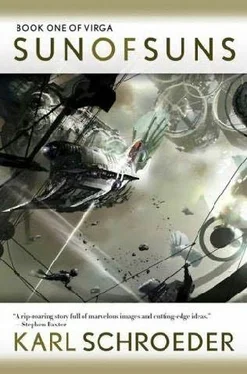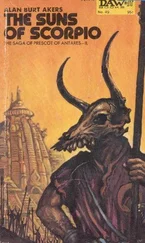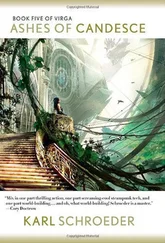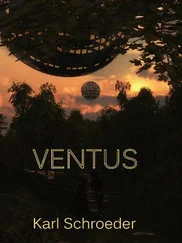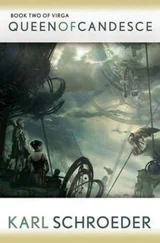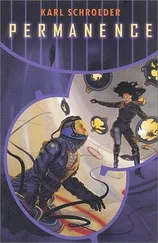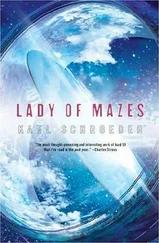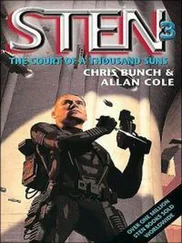Something like a giant black claw swept through the narrow space between the ships. One crewman who had been jumping the gap was suddenly gone. At the same time, both ships lurched and a series of loud rattling bangs shook the Hand.
"We're in the trees!" They had reached Leaf's Choir; apparently the navigators had misjudged the distance after all. More bangs, rattles, and cracks signaled impacts with the charred branches of the former forest. The Hand shuddered and began to slow.
The gap between the ships suddenly expanded. Hayden realized he was holding tight to a beam aboard a vessel that had no oxygen supply. Everyone he knew was on board the Rook, including Aubri. In seconds they would be separated and he might never see her again.
He spun and put his feet against the beam. Looking up he saw the square of light that was Rook's open hangar door. Men crowded there, but only one was looking in his direction. It was Carrier.
For a moment he and Venera's servant locked gazes. Hayden saw Carrier hesitate—just for a second—and then he extended his hand.
Hayden jumped. For a second he was in turbulent air, surrounded by lashing black branches and the scent of charcoal. Then Carrier had him by the wrist and was pulling him into the Rook. The hatch gang cheered.
Carrier let go and turned away. The boatswain pushed Hayden toward the inner door while shouting, "Shut the hatch! Tar it! Stand by for sargasso running."
Hayden looked back as the hatch closed. Carrier had disappeared. Through the closing hatch he could see the lights of the Unseen Hand flickering through a chaos of whipping branches. The Hand veered away, its light guttered and was lost; then the hatch slammed shut and the gang moved to seal it.
They had reached Leaf's Choir.
* * * * *
MOST OF THE Gehellen vessels fell back to circle the black forest in frustration, but some sargasso-equipped ships continued to follow the Slipstreamers. This made it risky for the Rook to slow down—but it was equally risky to continue at speed. The outermost layers of Leaf's Choir had been picked over by charcoal harvesters for centuries, and now consisted mostly of long spearlike trunks, denuded of branches, that wove and curved through the air for hundreds of feet at a time. These spears could puncture the hull of even an armored warship, if struck at high speed.
Each tree had originally been rooted to a small clump of asteroidal dirt. As they grew they wound branches around one another, like swimmers grasping for companions. With no sense of up or down, the trees had used Candesce and the local suns as their targets, sending threadlike stalks and branches through the empty air, spreading nets of leaves to catch light and passing moisture. Gradually, they had formed a vast and diffuse substance that made its own weather, caught drifting dust and stones and assimilated them, and greedily sucked up the carbon dioxide and smoke of the industries that thrived among them. Humans had woven the pliable branches into elaborate structures, entire cities of living green that went on, chamber by beautiful breathing chamber, for miles. Generations of gardeners cultivated their home trees, adding flowers and liana. Giant spheres and rods of water filled the central spaces, cupped by a thousand delicate fronds, in which fish and people swam. The people of Leaf's Choir had cleverly fashioned gigantic mirrors out of water—simply by stretching nets and wetting them until the water clinging to neighboring strands met and merged into a single surface—and used these to reflect the light of Candesce and their own two suns many miles into the forest.
All of it had burned. All was now black and sunless, the air replaced by stagnant smoke that never settled, merely eddied and spiraled around itself in an eternal dance of mourning.
The ships' navigators soon started cracking under the strain of finding their way through this gargantuan, mazelike tomb. They spent hours staring out at the advancing lines of black lit by the ships' headlights. Odd objects would appear in the light and slide by like hallucinations: window lintels, blackened shoes, spoons, and bedposts. The men began to swear they saw figures beckoning to them from the darkness beyond the branches.
And all the while, the Gehellens followed.
Chaison Fanning locked himself in the chart room with Gridde and Aubri Mahallan. They compared photographs of the measureless spaces and distant, branching buttresses of forest growth to the charts Aubri had found in the library. The precious treasure map from the tourist station waited in a glass case beneath the chart table. "It all hinges on finding the city of Carlinth," Gridde said over and over. "Find the city, we can find the rest of the way. If we don't…"
There were reports of men collapsing suddenly. Unless the air was kept moving, carbon dioxide, monoxides, and smoke from outside seeped in and pooled. You could put your head into an invisible cloud of death without knowing and just pass out. It was as though some unseen monster stalked the ship. Everybody watched everybody; nobody slept unless their face was near a fan.
Dangerous as it was, some men found themselves obsessively watching out the portholes. Hayden was one. He had no duties since the bikes were useless without oxygen. Though he hungered to be with her, Aubri was busy with the charts. The only way he could feel he was contributing was by maintaining some sense of where they were.
Of course he'd heard of sargassos. They happened whenever a forest became too large and caught fire. Normally, though, a sargasso didn't last long. Air moved through it chasing the smoke away. The charred raft of branches broke up or was taken apart and everything went back to normal. It was terrifying to mink that a forest could become so large that its sargasso could never be healed. As he watched he thought about the fact that an entire civilization was entombed here in the dark: the Rook hummed past chalk-white stone house cubes and blackened town wheels where only ghosts now dwelt.
There were hints in the lines and buttresses of the forest that Leaf's Choir had once been a realm of grand sculptured bubbles made up of smaller bubbles, a fractal palace with living walls. At times the perspectives became dizzying. Miles-wide chambers and arches had walls made up of buildings—houses as bricks, towers as pillars, the city as building material. It was almost reassuring that their full extent was no longer visible; the grandeur and the feeling of loss that must go with seeing it would be unbearable.
At times it seemed as though the Rook had entered some other plane of existence. Home, friends, ordinary cares no longer existed. There was only the breathing of the pumps and the distant roar of the engines. Faces were side-lit or merely imagined on silhouetted figures passing between the active workstations of the ship. And maybe this otherworldliness was what caused the crew of the Tormentor to let down their guard.
Hayden didn't see the missile itself. The Tormentor was somewhere out of view on the other side of the Rook. He did see a row of distant house windows, previously black, light up in lurid reds one after another—a quick whipcrack motion from right to left—and then the ghostly network of dead branches was thrown into stark relief by a burst of white light.
The roll of thunder followed moments later.
The illusion of peace was shattered by shouts, warning horns, and furious activity. The porthole suddenly moved away from Hayden as the Rook began to roll over. "Running lights off!" the boatswain was shouting. "Headlight off!"
"What are we doing?" demanded the airman from the Unseen Hand who Hayden had spoken to earlier. "Aren't we going to stand and fight?"
The boatswain shook his head. "Admiral's orders. The others are going to draw them away while we make a run for the treasure. Don't worry. He planned for this."
Читать дальше
